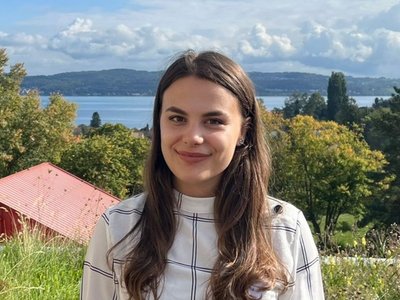

Since July 2023 Sonja Hoxha is doing her PhD at the University of Vienna on “Characterization of the biogeochemical self-purification processes in the Vjosa river network”. Her research is financed, within the APPEAR project Environmental assessment of the Vjosa Riverscape as a basis for an integrated water management and sustainable catchment development | VjoSusDev. The PhD study, which includes a large amount of field work, will provide a comprehensive, large-scale, catchment-based analysis of the environmental conditions of the Vjosa river system. This work will contribute to a better understanding of the river’s functioning at the catchment scale, as a basis for an in-depth evaluation of future management options, in the light of Sustainable Development Goals.
The Vjosa River is one of the last free-flowing, wild rivers in Europe. Completely undisturbed the river and its tributaries flow through inaccessible gorges and sections with huge gravel banks and islands along its nearly 270 km course from the Pindus Mountains in Greece to the Adriatic Sea in Albania. Together with its tributaries, the Vjosa River represents a river ecosystem characterised by near-natural flow regime and largely undisturbed hydromorphological dynamics. Due to the low degree of anthropogenic disturbance (e.g. lack of dams and regulation), the Vjosa river network is a hot spot of aquatic and terrestrial biodiversity. However, the river ecosystem does not only consist of the visible river channels, but more importantly of its bed sediments, the hyporheic zone and the riparian corridor. In addition, the river system, in conjunction with the shallow aquifer, carries water even during prolonged droughts and mitigates floods by inundating the floodplain. Taken together, the river network provides essential ecosystem services, with a huge water purification capacity of exceptional importance for biodiversity and human needs.
The aim of my PhD project is to qualitatively and quantitatively study the biogeochemical processes responsible for water purification in well-selected braided river sections. Here, the connectivity of the river channels with its hyporheic sediments and the alluvial aquifer in the vertical dimension is strong. Water purification depends on several parameters, such as sediment properties, organic matter content, nutrient concentrations, microbial community composition and water residence time in river bed sediments, which are modulated by hydromorphic conditions (e.g. canyons vs. braided or meandering river sections). Specifically, the PhD project will focus on carbon and nutrient cycling in selected stretches of the Vjosa River. The spatio-temporal distribution and transformation of different carbon (e.g. DOC, DIC, CO2, CH4), nitrogen (e.g. NO3, NO2, NH4), and phosphorus (e.g. PO4, TP) species will be studied in river sections that allow a good quantification of materials import, transformation, attenuation, and export. Together with the main physico-chemical conditions, water and sediment microbial communities will be analysed in terms of composition and functions using microbiological and molecular tools.
Sonja Hoxha graduated from the University of Tirana, Albania, with a B.Sc. in Biology and a M.Sc. in Environmental Biology in 2021. Part of her master thesis has been carried out at the Natural History Museum in Vienna, where she spent one month as a research visitor, within a framework of a bilateral project between Albania and Austria. Her research was on molecular genetic analyses of molluscs. For one year she was a guest researcher at the Department of Aquatic Ecotoxicology at the Goethe University, Frankfurt am Main, funded by a scholarship from the German Federal Environmental Foundation (DBU). Since July 2023 she is a PhD student at the Department of Functional and Evolutionary Ecology, University of Vienna, within the APPEAR project Environmental assessment of the Vjosa Riverscape as a basis for an integrated water management and sustainable catchment development | VjoSusDev.
